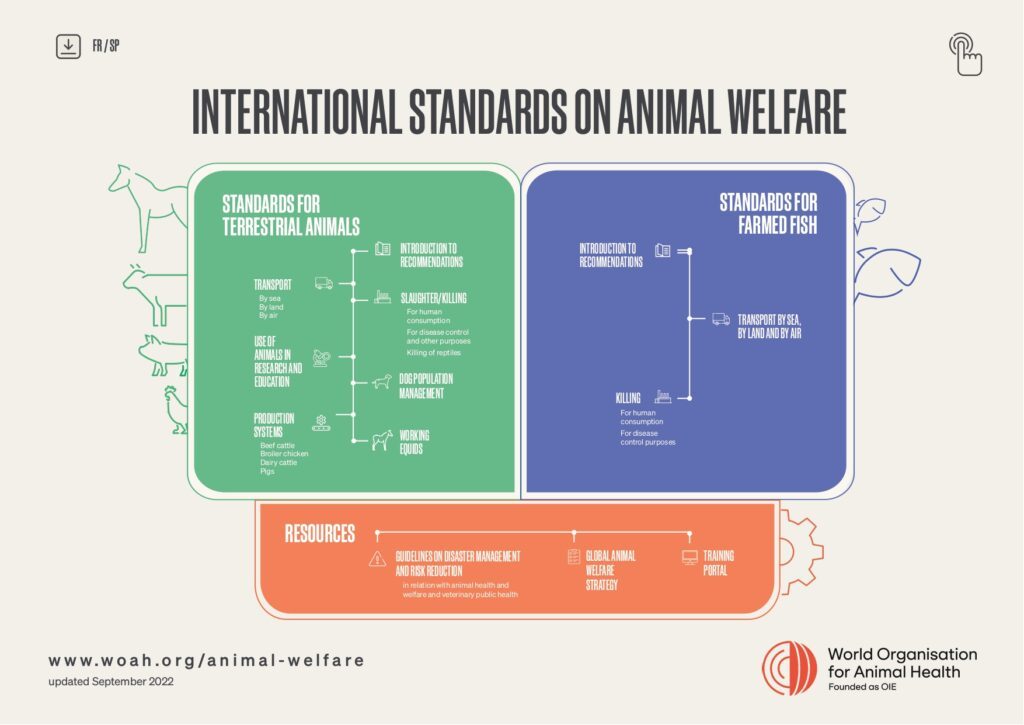Development of Animal Welfare Standards
Recognised international standards
The first World Organisation for Animal Health (WOAH) standards on animal welfare were published in the Terrestrial Code in 2004 and in the Aquatic Code in 2008, respectively. These science-based chapters are regularly updated as scientific knowledge evolves, and new standards are developed to cover different aspects of welfare in different species.
Members, experts and relevant international governmental and non-governmental organisations are consulted throughout the Standards-setting process .
The first WOAH standards on animal welfare addressed animal transport, the slaughter of animals, and killing for disease control purposes. Subsequently, other standards included the use of animals in research and education, dog population management and the welfare of working equids. The WOAH’s most recent work on animal welfare standards produced four new chapters since 2012 on production systems for beef, dairy cattle, broiler chickens and pigs and updated the chapter on stray dog population control in 2022.
Unlike the WOAH’s animal health and veterinary public health standards, animal welfare standards are not recognised in the WTO SPS Agreement. Nonetheless, they are the internationally recognised science-based standards for animal welfare adopted by the WOAH World Assembly of Delegates.
The infographic below lists the standards that have been published in the WOAH Terrestrial and Aquatic Codes and the topics on which the WOAH has initiated discussions.
Global network of scientific expertise
The WOAH has a strong global network of scientific expertise and regularly brings together subject-matter experts to contribute to the standard development process.
Collaborating Centres
The WOAH Animal Welfare Collaborating Centres aims to facilitate the development, review and implementation of animal welfare standards in their respective regions. The Centres work as a network to enable better communication amongst the various partners and to identify gaps in expertise that affect the development and implementation of the global and regional animal welfare strategies. The Centres are responsible for sharing knowledge and promoting outputs from the strategies. Find out more.
Animal welfare ad hoc groups
WOAH standards are developed through the work of expert ad hoc Groups that are convened to draft new or revised chapters. The reports of these ad hoc Groups are available on the dedicated page.
Animal Welfare Working Group (no longer active)
This Working Group led the development and review of the WOAH standards on animal welfare up until 2017. It was established in 2002 to coordinate and manage the animal welfare activities of the WOAH, including the advice on a strategic vision in animal welfare, as well as policies and guiding principles. The aim was to provide a sound foundation for the elaboration of standards (ref. Resolution n° XIV – May 2002).
Their meeting reports can be consulted below.
| May 2016 | May 2015 | June 2014 |
| June 2013 | June 2012 | June 2011 |
| June 2010 | June/July 2009 | June 2008 |
| September 2007 | July 2006 | September 2005 |
| December 2004 | February 2004 | October 2002 |
Natural disasters
In 2016, the WOAH published Guidelines on disaster management and risk reduction in relation to animal health, animal welfare and veterinary public health, with the aim of strengthening the capacity of Veterinary Services in its Members. Experience has shown that the prospects for sustainable recovery from natural disasters in affected communities are closely linked to the condition of their animals.

